|
How many results?
The short answer is: probably
lots! When I did a search, allowing all languages, for the English word octopus , the search engine AltaVista found 111400 pages that used the word. But when I entered the word pulpo , which is Spanish
for octopus, Alta Vista found only
2767 pages. That's still a lot of pages! This also illustrates how much information on the Web is in English. If you repeat this search today, your numbers will be different - guaranteed!
Order of results
While some search engines still throw up a results list
that is just a random selection of the pages found, most searches try
to read your mind. They put at the top of the list the pages they
think are most likely to be what you are looking for.
Each search site uses a different method to
decide how likely it is that a page is what you want. Here are some
features that are important in different search engines:
-
page title
-
hidden
keywords: the keywords META tag in the source code (doesn't
show on the page)
-
links: number of other pages that
link to the page
-
frequency: number of times a search
word is used on the page
-
location: how close to the top of
the page a search word is used
-
nearness: how close to each other
(for multiple search words)
-
click-through: number of times the page has been opened
from a results list
-
money: A few search engines accept
money to guarantee higher ranking in the results list.
What kinds of pages?
A search can turn up an amazing variety of sites. Search
results for the English word octopus included a employment agency, a business selling cables, a music site, a video producer, a diving medicine page about the blue-ringed octopus, a page of underwater photos, and an environmental site. The only thing they have in common is the word octopus!
Some search sites have filters that are intended to remove offensive
pages, such as pornographic sites, from the results. You may have the option
of turning such a filter on and off.
Multiple words
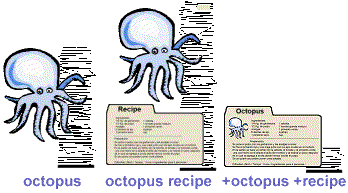 To target your search
better you can put several words in the search box. For example, to look
for recipes that use octopus you could search using the two words
octopus and recipe
. To target your search
better you can put several words in the search box. For example, to look
for recipes that use octopus you could search using the two words
octopus and recipe
.
Some search engines will list the pages that contain any of the words or
phrases you type in the search box. Some will show only pages that have
all
of the words.
For example, entering octopus recipe in AltaVista's
search box will produce pages containing either the word octopus or the word recipe anywhere on the page.
AltaVista's results increased from 111400 to over 141250 using these two
words. Pages with recipes moved to the top of the list since Alta Vista
thinks you are more likely to be interested in pages with both words.
Smart!
The same search in Google, shows only pages that contain
both the word octopus and the word
recipe . While searching on octopus in Google found 138000 pages, searching on
both words found only 2870 pages. A substantial difference from
AltaVista! But the results in Google are more likely to be what you want.
Require a Phrase
To require the phrase octopus recipe
to be on the page, you
usually enclose the words in double quotes like "octopus recipe" . Alta Vista found only 7
page that used this phrase. This phrase is probably too restrictive, since
many pages that actually have recipes using octopus may not ever put the
two words together in this way. But, in other situations, using an exact
phrase might give you a better list of pages to look at.
Require Multiple Words/Phrases
To insist that your keyword or phrase is on the page, place a + in front of it. By using +octopus +recipe you require that both words appear on the page. AltaVista's results shrank to 6590 using this combination.
Eliminate Words
If you want to eliminate from the list the pages that have a certain word or phrase, place a - in front of the word or phrase. To try and remove from the results list those recipes that use raw octopus, try +octopus +recipe -raw . Alta Vista's list shrank to 5532 entries.
Read the Help page!
You should review the Help or Tips
page for any search site that you use. Every search
service has its own special features and methods. You have to know the rules
to play the game!
Common Features to Check
for:
|
|---|
| Capitalization |
Will Octopus give the same
results as octopus ?
|
| Stemming |
Will a search for book
also list pages with words that start with "book",
like books , bookends , and bookkeeper ?
|
| Wild
Cards |
Can you use * or some other special character to search for stemming variations? That is, can you type in
book* to
find pages that include words that start with
book like books , bookends , and bookkeeper ?
|
| All
forms |
Does the search engine look for all forms of a word? If you
search for octopus will you also see results for the plural octopi ? For a verb like write would you also see pages with
the other verb forms, like wrote , written , and writing ?
|
| AND /
OR |
If you include two search words, like octopus
recipe does the search engine look for pages
with both octopus AND recipe, or does it look for pages with octopus
OR recipe. Can you type in the AND or OR yourself to control what
happens?
|
| + - |
Can you use + to require a word or
phrase to be present and - to require that it not be present on
the page? This has become very widely used, but there are still
search sites that don't use this
procedure.
|
 |
Step-by-Step: Keyword Search |
 |
|
What you will learn:
|
to search using one or more
words
to require a word or words be on the page
to require
that a word not be on the page
to search with a
phrase
|
Start with:

In this Step-by-Step section you will
do several searches with a simulation
of a search engine, called Quick Search. Your goal is
to find recipes that use octopus as an ingredient.
 In this simulation, you must type exactly what you are instructed to type or
nothing will happen when you click the Search button. Spelling is always
important, but in the simulation, spaces are important, too. If
nothing happens when you click the Search button, check your spelling and
look for spaces at the end or beginning or between words. In this simulation, you must type exactly what you are instructed to type or
nothing will happen when you click the Search button. Spelling is always
important, but in the simulation, spaces are important, too. If
nothing happens when you click the Search button, check your spelling and
look for spaces at the end or beginning or between words.
 The URLs and pages shown in the search
results lists are not real! I made them all up!! Only a few items will be listed on the example
results lists instead of the normal 10 or 25. (Sorry, my imagination got tired.) The
links will not go anywhere. The URLs and pages shown in the search
results lists are not real! I made them all up!! Only a few items will be listed on the example
results lists instead of the normal 10 or 25. (Sorry, my imagination got tired.) The
links will not go anywhere.
Search: One Word
You will start your search for recipes for octopus by searching with the single word octopus .
- If necessary, open the page
My Home Page or by using the Home button, if your
browser still has that page set as home page.
-
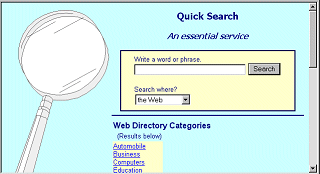 Click on the link Search the Web on the page My Home Page. Click on the link Search the Web on the page My Home Page.
A page opens that pretends to be a search engine named Quick Search. There is a keyword search box at the top of the page. Web directory topics are listed at the bottom. You will practice with first with keyword searching.
-
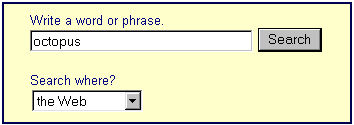 Type in the first text box the word octopus as your keyword. Leave the second box at the default choice the Web . Type in the first text box the word octopus as your keyword. Leave the second box at the default choice the Web .
-
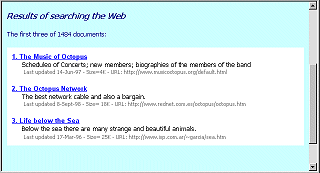 Click the Search
button. The results of the search appear in a new page. Click the Search
button. The results of the search appear in a new page.
Note the total number of documents so you can compare with later searches.
- Scroll up. The search boxes at the top display what you entered to generate
the list at the bottom.
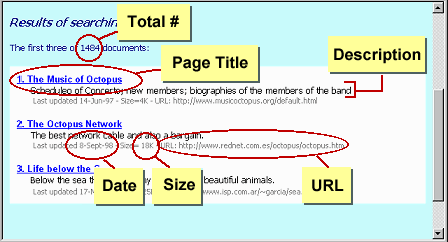
Total: Most search engines will first show the total number of documents found that match your search choices and then show 10 or 25 results at a time. If the list is longer, there will be a link of some sort to move to the next part of the list.
Title: what shows on the Title bar. Some programs used to write web pages will automatically put something in as a temporary title,
like "Write Title here". Such phrases are not helpful to the visitor, but are supposed to remind the page's author to create a title.
Description or
Quote: the first words on the page unless the page's author put a description paragraph into a special hidden tag on the page. Instead of a description, some search engines, like Google, quote the part of the page that contains your search word(s) so you can see its use in context.
Date: when the
page was updated last. This does not tell you what about the page was changed. It might be just a punctuation correction. Or it could be a complete revision of the page's contents.
Size: the page itself, not including all its graphics. This can give you an idea of how much information is on the page. Of course a barebones entrance page to a large site could be very small. This makes the description paragraph or page quote important to help you decide whether the site is worth looking at.
URL: The URL of the page can provide information
about what organization is providing the page. If the page won't load, go to the
site's home page and try to find it by working down through the site structure.
Sites get reorganized from time to time. (You can usually find the home page by
typing in just the first part of the URL in the Address Bar.)
Search: Two words
You will search for pages that contain either the word octopus or the word recipe .
-
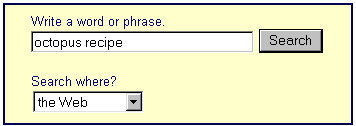 At the top of the results page, type the word recipe after octopus in the keyword box with
one space between them. At the top of the results page, type the word recipe after octopus in the keyword box with
one space between them.
- Leave the Web
in the second box.
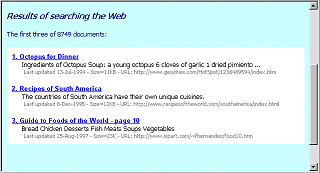 Click the Search
button. Click the Search
button.
Another results list displays. This one has a different total and different items in the list. Are these pages closer to what you seek?
Search: Required words
Many of the results you got using the one word octopus did not have anything to do with the octopus that lives in the sea. Adding recipe still included recipes besides ones that use octopus. Rather than read all 8749 items on the list, you will do a search that requires both
words to be used on the page. That should help.
-
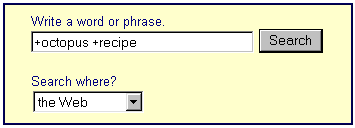 Scroll up to the top of the results page for octopus recipe . Scroll up to the top of the results page for octopus recipe .
- Leave the Web in the second box.
- Type a + in front of each of the two
words in the keywords text box. Hint: Use the big + key at the right of
the keyboard.
- Click the Search button.
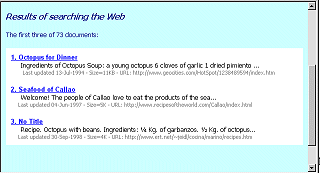 Another results list displays. Notice that the total number of pages has gone all the way down to 73. Each page on this list must contain the word octopus and the word recipe . Of
course there is still room for confusion since a page might use those
words but still not have a recipe for octopus. At least the list to look
at is much smaller now. Another results list displays. Notice that the total number of pages has gone all the way down to 73. Each page on this list must contain the word octopus and the word recipe . Of
course there is still room for confusion since a page might use those
words but still not have a recipe for octopus. At least the list to look
at is much smaller now.
Search: Eliminate word
You want to be sure the recipe actually cooks the octopus. You will attempt to restrict the results list to pages with recipes that use octopus but not raw octopus.
-
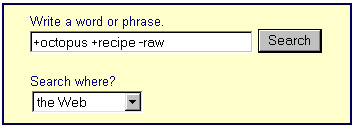 In the keywords text box at the top of the page, type the word -raw after +octopus +recipe . In the keywords text box at the top of the page, type the word -raw after +octopus +recipe .
- Click on the Search button.
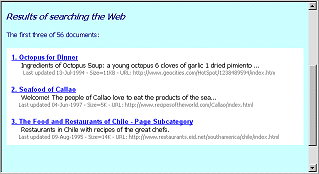 A new page displays which looks very similar to the previous one. The total number of results has decreased some to 56 and the third result shown is different from before. Apparently not many pages in the previous results list used the word raw. There must be a lot of people like you, who don't want their octopus to squiggle. A new page displays which looks very similar to the previous one. The total number of results has decreased some to 56 and the third result shown is different from before. Apparently not many pages in the previous results list used the word raw. There must be a lot of people like you, who don't want their octopus to squiggle.
Search: Phrase
Sometimes there is a specific phrase that should be on the page you are looking for. It can be trickier than it looks to pick the correct phrase. But it can be worth a try. Wrap your phrase with double quotes.
- In the search text box type "recipe for octopus" , including the double-quotes marks. Leave the Web in the Search where? box.
- Click on Search. The results page appears.
There is only 1 page that uses this exact phrase. Apparently this phrase was not a very good choice!
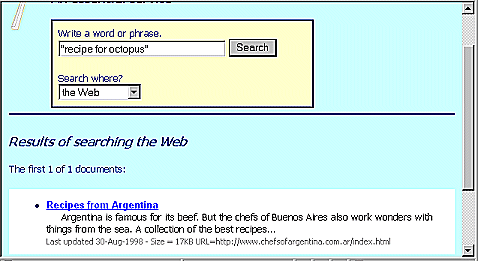
|

![]()
![]()